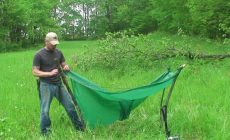Hunting is a valuable and enjoyable life skill that most people can only practice for a couple of weekends of the year. This isn’t true for hunting guides, who have turned their passion into a career. As with any job, there are benefits and challenges associated with being a hunting guide, so we’ve compiled a list of the eight things you’ll want to keep in mind when choosing this occupation.
1. Hunting guides do more than lead hunting trips.
A love of hunting is what draws people to the profession, but hunting guides are responsible for more than merely leading an expedition. Hunting guides plan and organize trips according to the season, environment and client preferences.
Catering to clients is a big part of being a hunting guide. Depending on the hunting outfit, a guide might also need to be a salesman and hospitality manager, including organizing lodging and preparing harvested game. Guides are also expected to advise clients on the hunting gear and equipment they’ll need, as well as teach them the ropes during the hunt.
2. Hunting guides are valuable.
As a hunting guide, you’ll be responsible for the safety of your clients. You might introduce a novice to the pastime or lead avid hunters through an environment unfamiliar to them in pursuit of a different game.
Hunting guides also play a significant role in protecting the environment. Guides champion an appreciation for nature and can aid forest management by providing a profitable method of wildlife population control. Game licensing fees are used by most state fish and wildlife services to fund wildlife management programs.
Hunting guides are also increasingly valued financially. The market for guided hunting experiences is growing, meaning there are positions open to skilled hunting guides.
3. It can be a demanding job.

As a hunting guide, you’ll have to put up with disagreeable clients, long days, and unpleasant weather. You’ll also have to be physically fit to carry heavy equipment and walking long distances over rough terrain.
As a guide, you might assist multiple hunting parties in a single day or oversee an overnight excursion, both of which could easily have you working 16-hour days with 3:00 a.m. start times. Extreme hot or cold temperatures increase the difficulty of sustaining your energy and attention over these prolonged working hours.
Hunting excursions also involve the risk of physical danger to the guide or clients. Hazards can arise from unexpected inclement weather, rough terrain, wildlife, insects, and plants as well as all-terrain vehicles and firearms. A guide should have extensive knowledge of first aid, outdoor survival skills, know the best performance hunting gear and always plan for emergencies.
4. You’ll need experience and education.
Clients look to hunting guides to know the environment, game, regulations, and best practices. To attain this kind of expertise, you’ll need to have the practical experience and specialized education.
You’ll need a hunting guide license to secure a position at a reputable outfit, which requires completing several courses. A hunting outfitter will probably request guides to have some education in the area, and state regulations might require a safety course. You can enroll in an intensive four-week guide school or take specialized courses.
If you intend to guide in an area you’ve spent lots of time hunting in, you probably already have a lot of hands-on experience. Still, an intensive training course might remedy your lack of expertise if you want to guide in an unfamiliar environment. Even as a guide, you’ll need to keep up to date on the latest techniques, equipment, regulations, and game behavior. Some of this will come quickly from working as a guide.
While knowledge of firearms, wildlife, and the environment is crucial to success as a hunting guide, soft skills are also necessary. A guide must have excellent communication and teaching skills to provide an enjoyable, informative and safe experience to the client.
5. Do your research on compensation.
The amount you can expect to earn as a hunting guide will vary greatly depending on your location, level of experience, and the type of hunt you lead. New guides generally only make $1,000 to $1,500 a month, but room and board are usually included in the compensation. After several seasons, guides can expect to make around $2,500 per month.
When weighing the financial feasibility of becoming a hunting guide, don’t forget about the associated costs of the venture. To become a guide, you’ll probably have to finance your education and equipment like hunting clothes and firearms.
6. You’ll probably give up hunting as a hobby.
When you guide hunts professionally, you’ll probably have less time and energy to hunt for yourself. Guides are expected to create a hunting lifestyle experience tailored to their clients, often at the expense of their own enjoyment. Monetizing a passion for hunting might make the experience less of a fun pastime and more akin to work.
However, you can also learn a lot about your hunting practice by guiding others. When you do find the time to head out on your own adventure, the knowledge and skills you gain as a guide will increase the probability of a successful hunt.
7. Beware of laws and regulations.
Hunting guides are free from the rules-oriented atmosphere of a corporate environment, but they must still comply with state and local regulations. You’ll be responsible for knowing the legal aspect of hunting for your client.
8. It’s a great experience.

Hunting guides get to explore parts of the wilderness that few people ever see. Guides are continually learning through experience about nature and the world. As a guide, you’ll have your share of hard-to-please clients, but you’ll also meet interesting people who can teach you a thing or two even as you lead the hunt.
Final Thoughts
Guiding hunting expeditions is not for the faint of heart. It is a demanding job that requires formal training and long hours, but for those who love the great outdoors and sharing their passion with others, being a hunting guide can be a rewarding job.
An additional benefit of being a hunting guide is that it can be a short-term prospect. The cost of guide school is relatively affordable, and former guides never forget their experiences.


















3 Comments
Adrian Kingston
February 8, 2021 - 9:08 amIt’s amazing. This blog will benefit many of those who love to hunting. Because there’s a lot to learn from here. I have bookmarked this blog to show my brother. Cause he loves hunting. And I think that hunting is impossible without a knife.
felin
April 15, 2021 - 5:56 pmVery interesting and more necessary tips that you have given here, thanks a lot
powerful airsoft
November 4, 2021 - 6:51 pmI would love to be a guide, I’ve considered it a few times but the job I wound up with won’t allow time off for a season. I still have the option to help out on hunts near me when they need extra help with packing, usually coastal mountain goat if the time at work is available to take off.